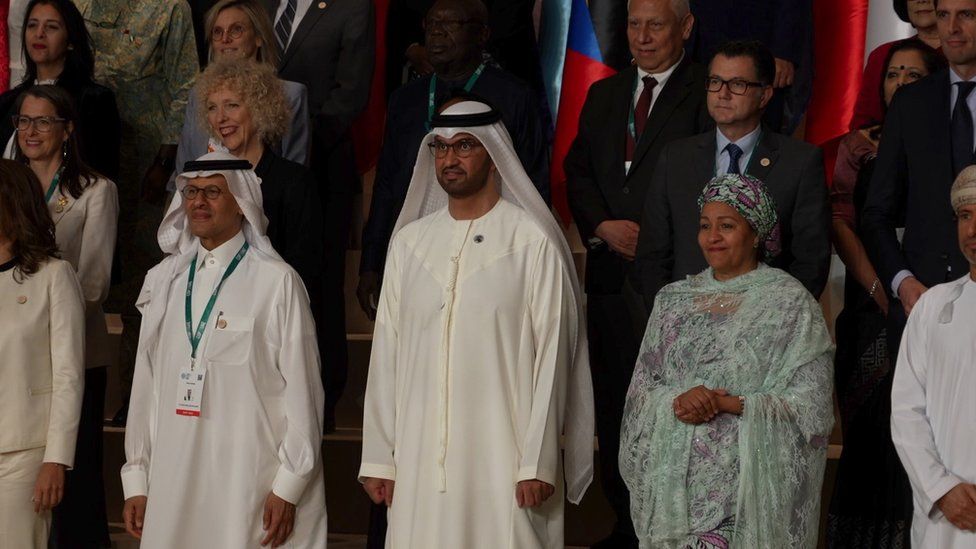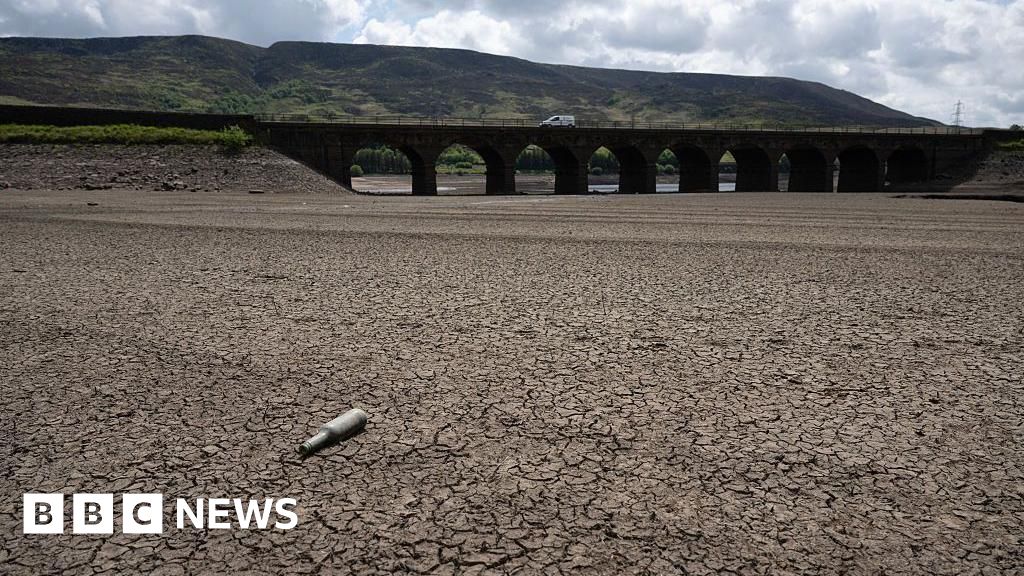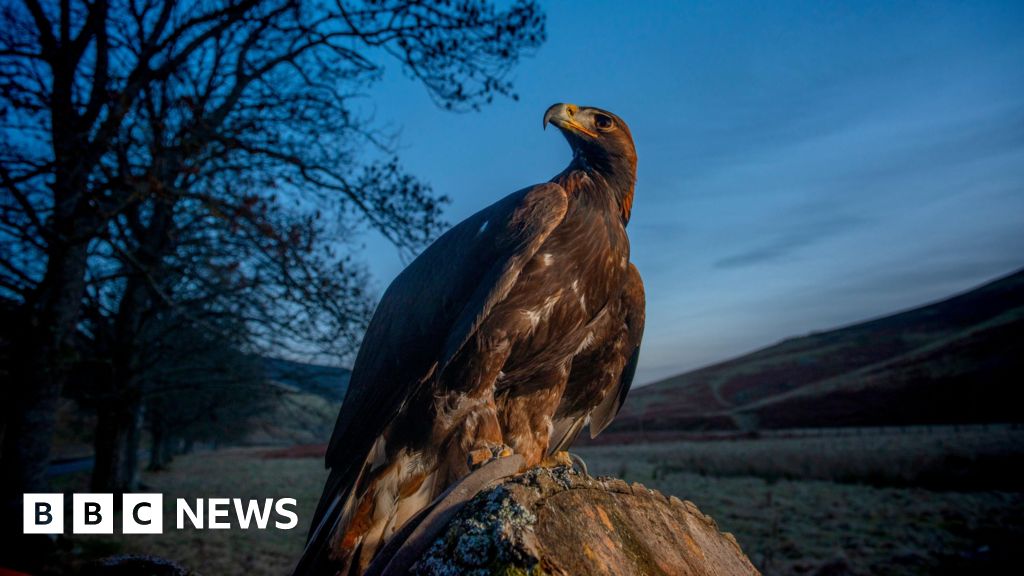ARTICLE AD BOX

COP28 president Sultan Al Jaber (centre) is hosting delegates in Abu Dhabi ahead of the conference in Dubai
By Justin Rowlatt
Climate editor, BBC News
There are already signs that deep divisions could hamper progress at the UN's crucial COP28 climate summit.
More than 70 environment ministers and 100 national delegations have been meeting in Abu Dhabi ahead of talks that begin in Dubai on November 30.
Many delegates doubt that a summit hosted by a petrostate - the United Arab Emirates - can shepherd the world towards a low carbon future.
This year is on track to be the hottest ever recorded globally.
That makes the urgent need for action clearer than ever.
The president of the COP28 conference, Sultan Al Jaber, acknowledged the challenges he faces.
"We must find common ground, ensure consensus and resolve differences," he urged in his opening speech.
But Mr Al Jaber is himself a deeply divisive figure.
He is also the head of Adnoc, the UAE's state oil company and one of the largest oil producers in the world.
Adnoc pumped 2.7 million barrels of oil per day in 2021, according to the Organisation of Petroleum Exporting Countries (Opec).
Greta Thunberg described his appointment as "completely ridiculous" and said it called into question the entire UN climate process.
Image source, EPA
Image caption,Climate activist Greta Thunberg says Sultan Al Jaber's appointment calls into question the entire UN climate process
The COP conferences "are not supposed to lead to a dramatic reduction in CO2 emissions," she told me at a rally in London recently. "If they were then they would not put an oil executive as the president."
Not surprisingly Mr Al Jaber takes a very different view.
He says climate change can only be solved if oil and gas are part of the discussion and argues his experience in the industry makes him the ideal person to push for action.
In Abu Dhabi this week Mr Al Jaber was at pains to lay to rest any doubts about his ambitions for the main talks.
He restated that the key goal would be keeping the world on track to limiting temperature rise to 1.5C above pre-industrial levels. Scientists say that should provide a good chance of avoiding the worst impacts of climate change.
And Mr Al Jaber accepted that achieving that will require deep emissions cuts.
"We need solid solutions for a 43% cut in emissions by 2030, because that is exactly what the science is telling us," he said.
But for many in the audience that commitment rang hollow, not least because Mr Al Jaber's oil company has bold expansion plans over the same period.
It plans to increase capacity by 600,000 barrels a day by 2030 and is spending $150bn in the process.
Image source, Getty Images
Image caption,Critics have questioned whether a major oil-producing state like the United Arab Emirates should be hosting a COP summit
Mr Al Jaber has justified the expansion saying the world will still need some oil and gas even as emissions fall - something the UN's climate science body, the Intergovernmental Panel on Climate Change (IPCC), has acknowledged.
He says in that situation oil and gas from the UAE should be the amongst the world's first choice, because barrel for barrel it is some of the lowest carbon oil to produce - although it creates the same amount of CO2 when it is actually burnt.
Arguments like this help explain how the UAE and other oil producing nations including Saudi Arabia, Russia and the US justify talking about the need to "phase down" fossil fuel production rather than phasing it out completely, given the CO2 they produce is the key source of greenhouse gas emissions.
The European Union is part of a loose coalition of about 80 nations that take a much tougher line. They say there can be no compromise on getting rid of fossil fuels.
"Our ambition is to really phase out fossil fuels ASAP and have language that does justice to that cause", says Wopke Hoestra, EU Commissioner for Climate Action.
Mr Al Jaber says he knows it is going to be hard to reconcile the "strong views" between nations on this crucial issue and urged the delegates in Abu Dhabi to do their best to find "common ground".
But there is deadlock on other issues too.
One of the big achievements of the last UN climate conference was to get global agreement to set up a "loss and damage" fund to help poor nations pay for the consequences of climate change.
Image source, Getty Images
Image caption,Parts of East Africa suffered its worst drought in 40 years, displacing nearly 1.2 million people in Somalia alone
But preparatory talks on how to set up such a fund and who might run it have already broken down and there are fears big polluting nations like the US could walk away from the discussions altogether.
Mr Al Jaber says he is desperately trying to get the negotiations back on track and this week announced the UAE would host an additional meeting of the committee responsible.
Even on issues where there is consensus, getting agreement at COP28 could prove elusive.
One of the UAE's key objectives for COP28 is to get the world to treble renewable energy capacity to 11,000GW by 2030.
Most major economies are already on board with that goal.
The G20, which represents the world's biggest economic powers and includes China, the United States and India, agreed to a major ramp up of renewables at a meeting in September.
However, some European nations and climate-vulnerable states have said they will only sign up to a commitment to clean energy if there is also agreement on phasing out fossil fuels.
These deep differences on core issues show just how difficult progress is likely to be when the COP28 conference begins on November 30.
It is very different from the heady optimism that greeted the signing of the Paris Agreement just eight years ago and reflects a fundamental change in the agenda of the talks.
Paris was about getting the nations of the world to agree in principle that they needed to work together to fight climate change.
These talks are now about getting countries to actually take action - a much trickier challenge.
What is clear from the meeting in Abu Dhabi this week is that when the main talks begin they are likely to be driven in large part not by a desire to protect the planet from global warming but by international rivalries, domestic politics and squabbles about cash.

 1 year ago
40
1 year ago
40








 English (US) ·
English (US) ·